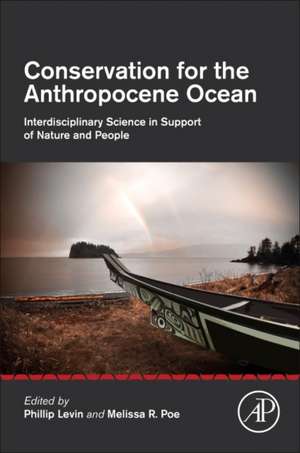Conservation for the Anthropocene Ocean: Interdisciplinary Science in Support of Nature and People
Editat de Phillip S. Levin, Melissa R. Poeen Limba Engleză Paperback – 12 iun 2017
A central challenge facing conservation is the development of practical means for addressing the interconnectedness of ecosystem health and human well-being, advancing the fundamental interdisciplinary science that underlies conservation practice, and implementing this science in decisions to manage, preserve, and restore ocean ecosystems.
Though humans have intentionally and unintentionally reshaped their environments for thousands of years, the scale and scope of human influence upon the oceans in the Anthropocene is unprecedented. Ocean science has increased our knowledge of the threats and impacts to ecological integrity, yet the unique scale and scope of changes increases uncertainty about responses of dynamic socio-ecological systems. Thus, to understand and protect the biodiversity of the ocean and ameliorate the negative impacts of ocean change on people, it is critical to understand human beliefs, values, behaviors, and impacts. Conversely, on a human-dominated planet, it is impossible to understand and address human well-being and chart a course for sustainable use of the oceans without understanding the implications of environmental change for human societies that depend on marine ecosystems and resources.
This work therefore presents a timely, needed, and interdisciplinary approach to the conservation of our oceans.
- Helps marine conservation scientists apply principles from oceanography, ecology, anthropology, economics, political science, and other natural and social sciences to manage and preserve marine biodiversity
- Facilitates understanding of how and why social and environmental processes are coupled in the quest to achieve healthy and sustainable oceans
- Uses a combination of expository material, practical approaches, and forward-looking theoretical discussions to enhance value for readers as they consider conservation research, management and planning
Preț: 315.29 lei
Preț vechi: 399.64 lei
-21% Nou
Puncte Express: 473
Preț estimativ în valută:
60.34€ • 62.75$ • 50.50£
60.34€ • 62.75$ • 50.50£
Carte tipărită la comandă
Livrare economică 07-21 martie
Preluare comenzi: 021 569.72.76
Specificații
ISBN-13: 9780128053751
ISBN-10: 0128053755
Pagini: 530
Dimensiuni: 152 x 229 x 29 mm
Greutate: 0.84 kg
Editura: ELSEVIER SCIENCE
ISBN-10: 0128053755
Pagini: 530
Dimensiuni: 152 x 229 x 29 mm
Greutate: 0.84 kg
Editura: ELSEVIER SCIENCE
Cuprins
I. Setting the stage
1. Strategies for Bridging the Science-Policy Interface for Adaptive Solutions in the Anthropocene
2. Climate Variability, Climate Change, and Conservation in a Dynamic Ocean
3. The Future of Species in the Anthropocene Seas
4. How Can the Oceans Feed 9 Billion People?
5. Social Resilience in the Anthropocene Ocean
II. Principles for Conservation in the Anthropocene
6. Principles for Interdisciplinary Conservation
7. Creating Space for Community in Marine Conservation and Management: mapping “communities-at-sea
8. Conservation Actions at Global and Local Scales in Marine Social-Ecological Systems: status, gaps, and ways forward
9. Ocean Cultures: Northwest coast ecosystems and indigenous management systems
10. Blurred Lines: what’s a non-native species in the Anthropocene ocean?
11. Can Ecosystem Services Make Conservation Normal and Commonplace?
12. Beyond Privatization: rethinking fisheries stewardship and conservation in the North Pacific
13. Addressing Socio-Ecological Tipping Points and Safe Operating Spaces in the Anthropocene
III. Conservation in the Anthropocene in Practice
14. Stakeholder Participation in Marine Management: the importance of transparency and rules for participation
15. Marine Conservation as Complex Cooperative and Competitive Human Interactions
16. Transdisciplinary Research for Conservation and Sustainable Development Planning in the Caribbean
17. Social-Ecological Trade-Offs in Baltic Sea Fisheries Management
18. Human Rights and the Sustainability of Fisheries
IV. Looking Forward
19. Implications of a Changing Climate for Food Sovereignty in Coastal British Columbia
20. The Future of Modelling to Support Conservation Decisions in the Anthropocene Ocean
21. The Big Role of Coastal Communities and Small-Scale Fishers in Ocean Conservation
22. Innovations in Collaborative Science: Advancing citizen science, crowdsourcing and participatory modeling to understand and manage marine social-ecological systems
23. Looking Forward: interconnectedness in the Anthropocene ocean
1. Strategies for Bridging the Science-Policy Interface for Adaptive Solutions in the Anthropocene
2. Climate Variability, Climate Change, and Conservation in a Dynamic Ocean
3. The Future of Species in the Anthropocene Seas
4. How Can the Oceans Feed 9 Billion People?
5. Social Resilience in the Anthropocene Ocean
II. Principles for Conservation in the Anthropocene
6. Principles for Interdisciplinary Conservation
7. Creating Space for Community in Marine Conservation and Management: mapping “communities-at-sea
8. Conservation Actions at Global and Local Scales in Marine Social-Ecological Systems: status, gaps, and ways forward
9. Ocean Cultures: Northwest coast ecosystems and indigenous management systems
10. Blurred Lines: what’s a non-native species in the Anthropocene ocean?
11. Can Ecosystem Services Make Conservation Normal and Commonplace?
12. Beyond Privatization: rethinking fisheries stewardship and conservation in the North Pacific
13. Addressing Socio-Ecological Tipping Points and Safe Operating Spaces in the Anthropocene
III. Conservation in the Anthropocene in Practice
14. Stakeholder Participation in Marine Management: the importance of transparency and rules for participation
15. Marine Conservation as Complex Cooperative and Competitive Human Interactions
16. Transdisciplinary Research for Conservation and Sustainable Development Planning in the Caribbean
17. Social-Ecological Trade-Offs in Baltic Sea Fisheries Management
18. Human Rights and the Sustainability of Fisheries
IV. Looking Forward
19. Implications of a Changing Climate for Food Sovereignty in Coastal British Columbia
20. The Future of Modelling to Support Conservation Decisions in the Anthropocene Ocean
21. The Big Role of Coastal Communities and Small-Scale Fishers in Ocean Conservation
22. Innovations in Collaborative Science: Advancing citizen science, crowdsourcing and participatory modeling to understand and manage marine social-ecological systems
23. Looking Forward: interconnectedness in the Anthropocene ocean
